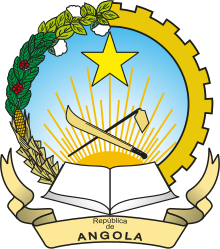Alvor Convention
The Alvor Convention , in Portuguese "Acordo do Alvor", is an agreement or an agreement in the form of a contract dated January 1975 between Portugal and the three independence movements of Angola, Movimento Popular de Libertação de Angola (MPLA), Frente Nacional de Libertação de Angola (FNLA) and União Nacional para a Independência Total de Angola (Unita), which should regulate the transition of the country to state independence . It was signed on January 15, 1975 by those involved in the Hotel Penina in the Algarve town of Alvor .
Almost all of the essential provisions of the 60 articles of the agreement were found to be obsolete within a few weeks. The fundamental decision for the complete Portuguese withdrawal from Africa had already been made after the Carnation Revolution and the Portuguese colonial war ended in retreat battles to secure the withdrawal of soldiers and civilians. A main Portuguese interest was the restriction of the massive withdrawal of white settlers, a concept that was partially thwarted by the High Commissioner for Angola António Rosa Coutinho , who, against considerable resistance on all sides, pushed through the unpopular participation of the Marxist-oriented MPLA. Not only could they expect the least sympathy for the concerns of the whites, they had already occupied the Cabinda exclave with Cuban help in November 1974 , thus not only creating a basis for the long-lasting Cabinda conflict , but also in the first place the Frente para a Libertação do Enclave de Cabinda (FLEC), which operates in the Congolese enclave, has been excluded from participating in the meeting in the Algarve. Rosa Coutinho also asserted his MPLA support in this regard in Article 3, in which it was historically factual: Cabinda é parte integrante e inalienável do território angolano - Cabinda is an integral and inalienable part of Angolan territory.
More important, however, were the conflicting interests of the parties involved, which were already recognizable in January 1975, which made the agreement expressed in the preamble, "acordaram" , appear so absurd - the civil war in Angola was basically already underway, the one in Articles 6 and 7 announced ceasefire ineffective - like Portuguese remaining reservations regarding, for example, the High Commissioner (11-13), the presidential college and a transitional government (14-18) as well as foreign affairs and defense. One of the signatories, the Portuguese Prime Minister from September 1975 José Baptista Pinheiro de Azevedo , later described the entire work as a scrap of paper of no value .
Important Angolan participants
- Agostinho Neto (MPLA)
- Holden Roberto (FNLA)
- Jonas Savimbi (Unita)
On the Portuguese side, in addition to Coutinho and de Azevedo, Ernesto Melo Antunes , Francisco da Costa Gomes , Mário Soares and António de Almeida Santos were also present.
Web links
- Text of the Convention (Portuguese)
- Um acordo político que nicht evitou a guerra em Angola , Diário de Notícias of January 15, 2009, accessed August 9, 2011
Individual evidence
- ↑ Rosa Coutinho um autentico Monte de Merda on cabinda.net
- ↑ http://www.cabinda.net/ (English)
- ↑ Uma Mortalha, por Berço , macua.org
